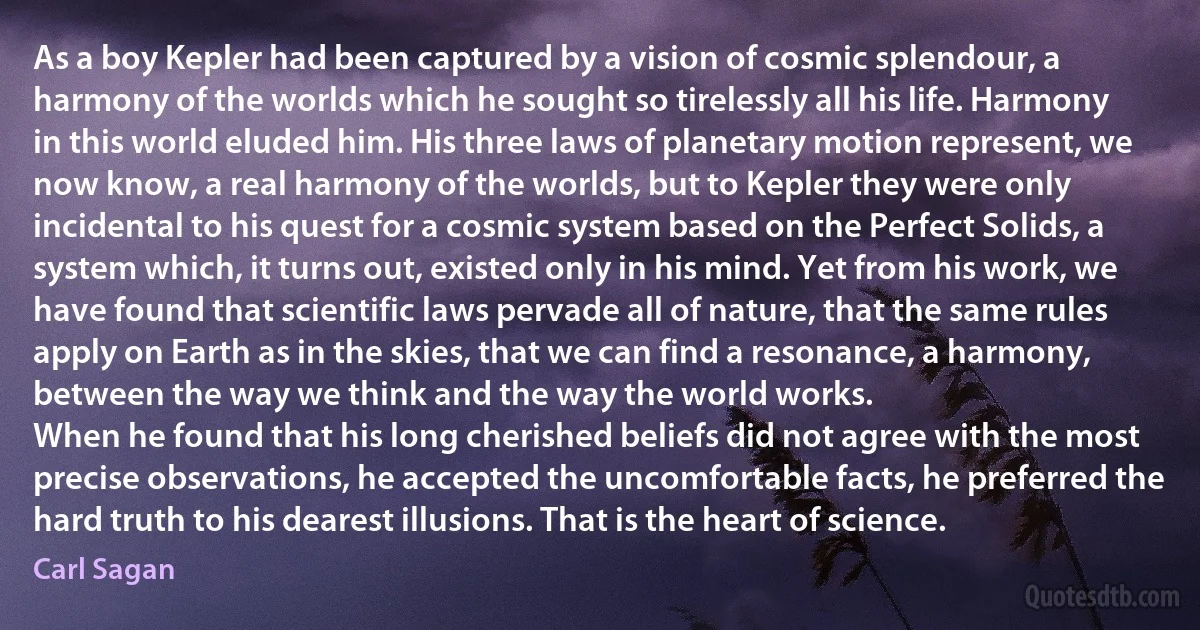
As a boy Kepler had been captured by a vision of cosmic splendour, a harmony of the worlds which he sought so tirelessly all his life. Harmony in this world eluded him. His three laws of planetary motion represent, we now know, a real harmony of the worlds, but to Kepler they were only incidental to his quest for a cosmic system based on the Perfect Solids, a system which, it turns out, existed only in his mind. Yet from his work, we have found that scientific laws pervade all of nature, that the same rules apply on Earth as in the skies, that we can find a resonance, a harmony, between the way we think and the way the world works. When he found that his long cherished beliefs did not agree with the most precise observations, he accepted the uncomfortable facts, he preferred the hard truth to his dearest illusions. That is the heart of science.
Carl SaganRelated topics
boy earth found find hard harmony heart life mind nature now perfect planetary real resonance science seek think three truth vision way work world yet incidental works Kepler Laws splendour facts RulesRelated quotes
This morning I received a letter from de Bellio. He writes that he does not believe scientific research into the nature of color and light can help the artist, neither can anatomy nor the laws of optics. He wants to discuss these questions with me and find out my views. Now everything depends on how this knowledge is to be used. But surely it is clear that we could not pursue our studies of light with much assurance if we did not have as a guide the discoveries of Chevreul and other scientists. I would not have distinguished between local color and light if science had not given us the hint; the same holds true for complementary colors, contrasting colors, etc. 'Yes', he will tell me: 'but these have always been taken into account, look at Monet' It is at this point that the question becomes serious!

Camille Pissarro
..the equivalence of sounds, gratings, scratches, explosions, shots, blows, hammering, shouts, resonance, echoes in space; meditation of a cosmic theme, reflection for the contemplation of the earth, of magma, of lava, of ash; battlefield; garden; play-field; destiny of the ephemeral.. .Far from the cliché people have of artists holding the baggage of necessary originality, personality, style, etc., that calls for an outsider's discussion of the works, for the author there is, foremost, a nucleus of thought that is more anonymous and collective and of which artists are but humble servants. This is surely the zone where wisdom is deposited, the wisdom that one may really find beneath all ideologies and the contingencies of this world. It is the impulse of our life instinct for knowledge, love and freedom that has been kept and fed by the wisdom of all time.

Antoni Tàpies
Esaias says: "The wolf also shall feed with the lamb, and the leopard shall take his rest with the kid; the calf also, and the bull, and the lion shall eat together; and a little boy shall lead them. ...” I am quite aware that some persons endeavour to refer these words to the case of savage men, both of different nations and various habits, who come to believe, and when they have believed, act in harmony with the righteous. But although this is [true] now with regard to some men coming from various nations to the harmony of the faith, nevertheless in the resurrection of the just [the words shall also apply] to those animals mentioned. For God is rich in all things. And it is right that when the creation is restored, all the animals should ... revert to the food originally given by God ... that is, the productions of the earth.

Irenaeus
During my controlled near-death experiences, I've met Sir Isaac Newton, who died back in 1727 as often as I've met Saint Peter. They both hang out at the Heaven end of the blue tunnel of the Afterlife. Saint Peter is there because it's his job. Sir Isaac is there because of his insatiable curiosity about what the blue tunnel is, how the blue tunnel works.
It isn't enough for Newton that during his eighty-five years on Earth he invented calculus, codified and quantified the laws of gravity, motion and optics, and designed the first reflecting telescope. He can't forgive himself for having left it to Darwin to come up with the theory of evolution, to Pasteur to come up with the germ theory, and to Albert Einstein to come up with relativity. "I must have been deaf, dumb, and blind not to have come up with those myself,” he said to me. "What could have been more obvious?”.

Kurt Vonnegut
When the dialectical method is applied to the study of economic problems, economic phenomena are not viewed separately from each other, by bits and pieces, but in their inner connection as an integrated totality, structured around, and by, a basic predominant mode of production. This totality is analysed in all its aspects and manifestations, as determined by certain given laws of motion, which relate also to its origins and its inevitable disappearance. These laws of motion of the given mode of production are discovered to be nothing but the unfolding of the inner contradictions of that structure, which define its very nature. The given economic structure is seen to be characterized at one and the same time by the unity of these contradictions and by their struggle, both of which determine the constant changes which it undergoes.

Ernest Mandel
